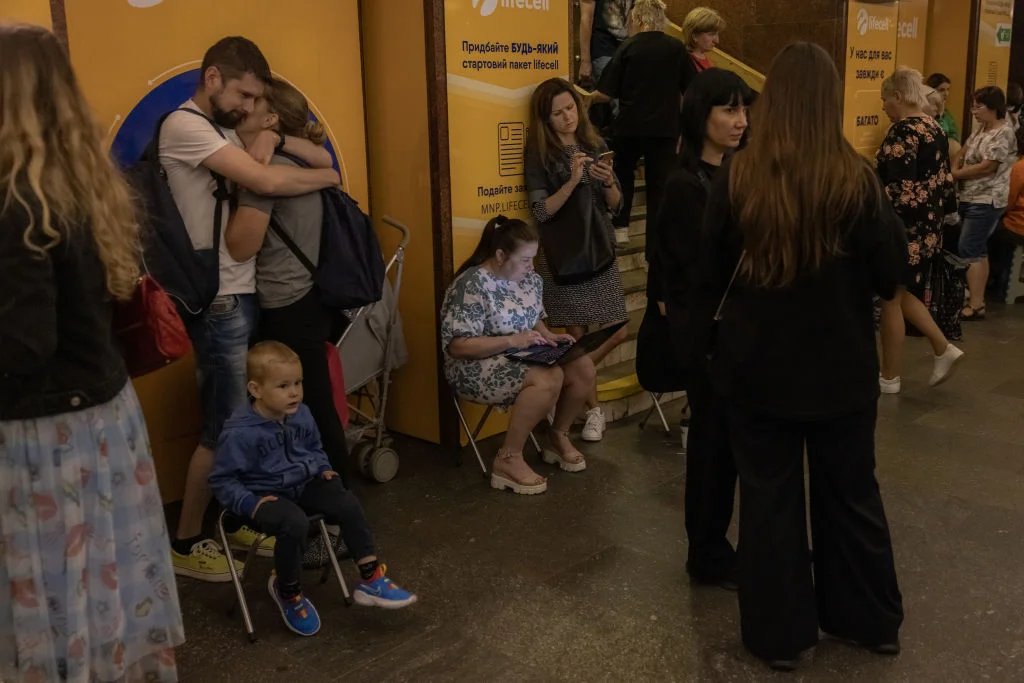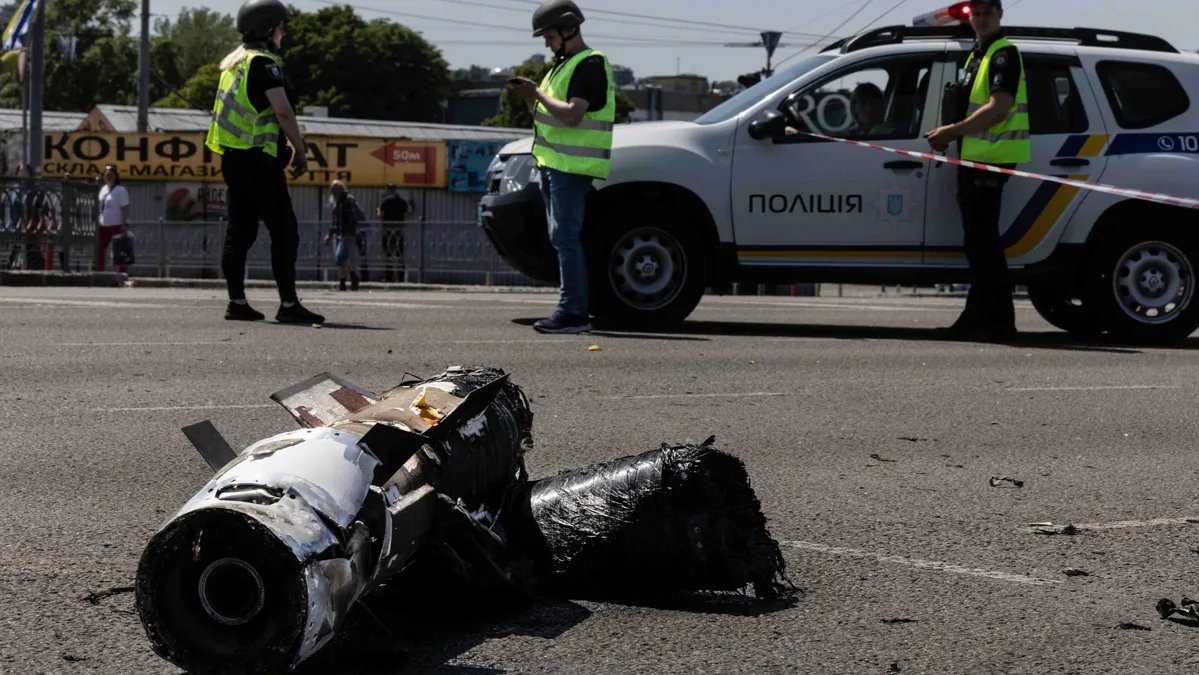I’m writing this article sitting on the floor of my bathroom, which has served as a makeshift bedroom and office for almost the past year and a half. A friend from Israel recently told me about mamads: specially fortified rooms in residential buildings that can withstand shockwaves and protect against missile debris. My faith and hope, however, lie mainly with Kyiv’s air defence forces. They’re true heroes and true professionals. Rarely does a May night go by here without an air attack, be it from missiles, Iranian Shahed drones, or both at once.
On the night of Sunday 28th May, the number of attacks this month rose to fifteen. But Russia decided to “treat” us on Monday morning, too, with Iskander missiles launched on a ballistic trajectory. When these things are shot down, a white ball forms in the sky and the whole building shudders. Sometimes the explosions sound one after the other, like a cannonade. I’m long past the point of wanting to record and make notes of what I feel during the attacks. It’s not that I’ve become used to living in mortal danger, it’s just that fear isn’t constructive. Everyone takes the precautions that their nervous system considers appropriate.
Many people once again shelter in metro stations, taking their children — including babies — as well as pets in carriers and on leads, sleeping mats, and bottles of water. Others — those who have shelters nearby — occupy their usual places in them.
Some people just head for the underpass nearest to their home. I’m conscious of the fact that most people stay in their high-rise buildings.
The nighttime air raid warnings usually last around four to five hours. The final explosions come in the dawn mist, when the birds are just starting to sing. It’s amazing how the city doesn’t stop functioning despite this chronic lack of sleep.

Kyiv residents shelter from air attacks in the metro. Photo: Roman Pilipey / Getty Images
Surgeons don’t cancel operations, public transport drivers set off on their routes as scheduled, utility workers manage to collect rubbish regularly, and shops open as normal.
Kyiv Day, which traditionally falls on the last Sunday of spring and is one of the most popular public holidays, hasn’t been cancelled either. The exact date of Kyiv’s founding is still a topic of debate among historians. As per the legend, the city is generally considered to have been founded in the year 482, meaning that 2023 marked its 1541st birthday.
This year, Kyiv Day was an even bigger celebration than normal for my family: my son came back from the front for a short visit, and we went off to see the sights together. Because it has to be seen: the sun, the greenery, the parks in bloom, the people dressed in bright colours. It’s strange to think that the night before had been a “fiery” one, too.
For obvious reasons, there were no special mass celebrations this year, nor was there the usual fireworks display over the Dnipro River. Even after we win the war, I’m not sure there’ll be any fireworks displays for a while. The Kyiv History Museum prepared a series of events, including interesting lectures and workshops for children. Zhovten Cinema held photo exhibitions and fairs, while the National Centre of Folk Culture also hosted a folk art fair. Kyiv City Council gave free guided tours of the historic districts of Lukianivka, the Square of Contracts, and Podil. The National Museum of the History of Ukraine opened an exhibition of old musical instruments, clothing, and household items, and hosted a concert of music played on the bandura, Ukraine’s national instrument. Oleksandr Polozhynsky, frontman of the band Tartak and a soldier in the Ukrainian army’s 47th Assault Brigade, also gave a concert at Docker Pub.
As usual, curfew fell at midnight. But the streets were empty earlier; public transport has its own deadline now.
Forty minutes after midnight, the siren began to sound. Of course, Russia couldn’t just let us have our holiday!
So, on Sunday night, almost 40 missiles and kamikaze drones flew to Kyiv, and almost all of them were shot down. In the city’s Podil district, debris fell on a private house, with firefighters and paramedics immediately rushing to the scene. One person was hospitalised. In my district — Sviatoshynskyi — debris falling on an empty residential building caused a fire, which was extinguished. Debris also fell in the Holosiivskyi district.
As for the results of Monday morning’s Iskander missile attack: it started at 11:09, when the streets were full of people. The Russian army paid special attention to the city centre, where it sent 5 or 6 missiles. The Patriot air defence system is worth its weight in gold. I don’t even want to think what we’d do without it. This time, it turned all eleven potentially lethal missiles into scrap metal.
In the Obolon district, near Pochaina metro station, debris fell and caught fire in the middle of the road, narrowly missing a minibus.
Debris also fell in the Dniprovskyi and Desnianskyi districts, on the left bank of the river. According to the Kyiv City Military Administration, no critical damage was caused, though this is still being assessed, as is information about possible casualties.
Videos of schoolchildren running to a shelter and a woman standing next to her car, which was hit by a piece of rocket shrapnel as she was driving it, have been circulated widely in city media.
But it’s a different story that’s been attracting a record number of views: another video shows a bride and groom kissing in a car park as guests applaud them. The air raid siren started sounding just as the couple were getting to the registry office. Obviously, when the siren sounds, everything stops working — but even an Iskander missile wasn’t going to spoil their wedding.
“I have no idea how you can endure it all. People aren’t made of iron,” wrote a friend of mine who left. I wanted to reply, but I didn’t. He wouldn’t understand.
Kyiv
Join us in rebuilding Novaya Gazeta Europe
The Russian government has banned independent media. We were forced to leave our country in order to keep doing our job, telling our readers about what is going on Russia, Ukraine and Europe.
We will continue fighting against warfare and dictatorship. We believe that freedom of speech is the most efficient antidote against tyranny. Support us financially to help us fight for peace and freedom.
By clicking the Support button, you agree to the processing of your personal data.
To cancel a regular donation, please write to [email protected]

